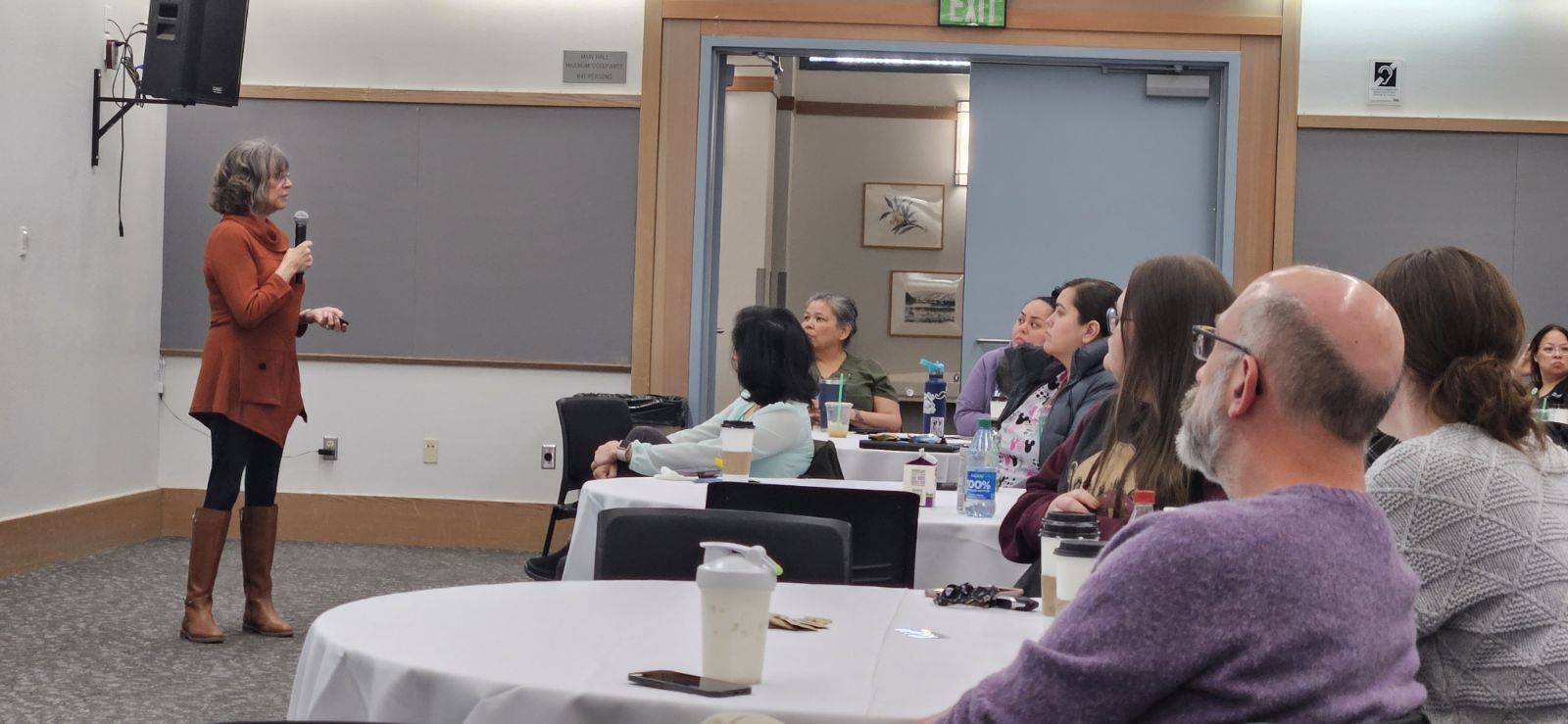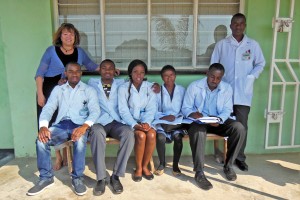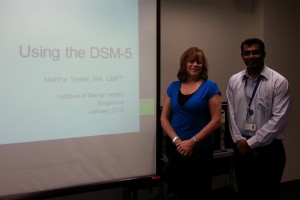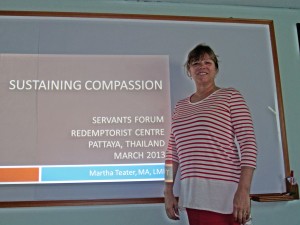
Training staff of a tribal health organization in Alaska
I am passionate about training behavioral health professionals so they can enhance their clinical skills. It’s a joy to see them renew their energy and enthusiasm for the work.
I have completed a series of three webcasts through Western Carolina University. The topics are treating pain, compassion fatigue, and counseling tools for the non-counselor in healthcare. You are welcome to access these here. Thanks to the Visiting Scholar Program at WCU for arranging these programs!
Here’s a comment from someone texting the training contact person after a recent training in Alaska, ” So gotta admit I was annoyed having to go up to the thing this morning, but that was great!! Thank you for that!!” The person who arranged the training later said, “The positive feedback continues to lood in! People are going out of their way to tell me how impressed they were with the training and how much they learned. It’s not just me and the providers who are excited about working with you now.”
Here’s an unsolicited testimonial following a recent training: “I was recently at the CBT for Trauma Treatment in Pittsburgh, PA. The presenter was Martha Teater, MA, LMFT, LCAS, LPC and it was excellent. As an addiction specialist many of my patients have turned to the ever so popular opiates to avoid and numb the pain from previous and/or ongoing trauma. Substance Use Disorders (particularly chronic opioid abuse) have become an epidemic in society in general, but Pittsburgh, PA in particular. In addition, this training also focused on secondary traumatic stress and burnout for those of us who work directly with this population and the information provided was very helpful. In addition to having my own caseload, I also train new staff and this will now become part of the training for new counselors at our facility in hopes of minimizing burnout and turnover. I recommend that clinicians and first responders attend this training whenever and wherever possible.”
And here’s another comment about a training: “Your presentation was so useful, eye-opening, and easy to understand. I have left many trainings with the knowledge of a disorder or treatment modality, but didn’t necessarily feel like I could begin integrating it into my practice. I left yesterday with real life tools to use that answer the hard questions and attitudes clients come with when they experience pain (understandably!) in a compassionate way. The sources you used were very informative and the handouts were equally useful and I plan to use them with my clients. It is clear you’ve put a ton of effort into making the presentation and that you’re very passionate about the field. Thanks again, I definitely got my money’s worth out of that training.”
And one more: “I enjoyed the training (it is definitely in my Top 3 trainings) and learned so much. We left excited, motivated and definitely eager to use the knowledge you shared to help others.”


I have presented workshops in all 50 states and internationally for many organizations. I am also a professional speaker with PESI and have led 239 full-day seminars for them on a variety of topics.
Some of the topics I present on include:
Behavioral treatment of chronic pain: We have a couple of huge issues related to this topic…a good percentage of Americans deal with chronic pain, and we are facing a devastating epidemic of opioid misuse and death. Recent CDC guidelines emphasize the need to treat pain from a behavioral perspective, which reduces pain and minimizes the use of opioids. CBT is a treatment of choice for this. I provide CBT and I also offer training and consultation in this area.
DSM-5 and DSM-5-TR: I provide training on the Diagnostic and Statistical Manual, 5th edition (DSM-5) and DSM-5-Text Revision (DSM-5-TR) that serve as our diagnostic guides. There are significant changes in the way mental health issues are diagnosed, and all professionals will need to use this manual in their work with people. I was a collaborating clinical investigator during the field trials phase of development, and was able to be in San Francisco for the release of the manual at the American Psychiatric Association conference.
I was invited to be part of the Psychotherapy Networker video training series “The Uproar Over DSM-5“. My session was called “Navigating the New DSM-5: Ten Ways it will Impact Your Practice”.
Compassion fatigue: This helps people understand the negative impact of working with traumatized people. It’s the secondary impact of trauma. During this training we look at signs of compassion fatigue, resilience, burnout, empathy, and self-care. Participants complete a self-assessment to see if they have signs of compassion fatigue. They also develop their own personal prevention plan. This corresponds with the workbook I coauthored, Overcoming Compassion Fatigue: A Practical Resilience Workbook.
Ethics: There are interactive and fun ways to learn about ethics while obtaining valuable continuing education hours. I’ve put together a training that provides cutting-edge information into an engaging learning experience.
Integrated healthcare: This treatment model truly is the most effective way to treat people’s behavioral and physical health needs. During this presentation we discuss brief assessment tools and way of maximizing patient care by working more closely with the medical community.
I have provided trainings for the following organizations:
- Alabama Council of Community Mental Health Boards
- Alaska: Center for Rural Health and Health Workforce
- Alaska Federal Healthcare Partnership
- Alaska: Tlingit and Haida Tribes
- Alaska: Juneau Alliance for Mental Health
- Alaska: Ketchikan Indian Communities
- Alaska: Providence Kodiak Island Counseling Center
- Alaska: Regional Alcohol and Drug Abuse Counselor Training Conference
- Alaska: Southeast Alaska Regional Health Consortium Pain Summit and Educational Training
- Alaska: University of Alaska: Anchorage, Center for Human Development Project ECHO hub team member and presenter
- Alaska: University of Alaska: Anchorage, Family Services Training Center lead trainer for Tools for Working with Families training series
- American Academy for Marriage and Family Therapy annual conferences
- Arizona: Little Colorado Medical Center
- Arizona: Navajo County Public Health
- Arizona: SAFE House
- Arkansas: University of Arkansas Little Rock Medical School
- Arkansas: University of Arkansas Little Rock, MidSOUTH Training Center
- California: Bienvenidos
- California: Camp Pendleton
- California: Five Acres
- California: Los Angeles County
- California: Maryvale
- California: Modoc Medical Clinic
- California: San Diego North County Chapter, California Association for Marriage and Family Therapy
- California: Siskiyou County Behavioral Health
- Canada: Zarchikoff and Associates trainings for Indigenous communities
- Colorado: Annual International Winter Symposium on Addictive Disorders, Behavioral Health, and Mental Health
- Colorado: City and County of Denver Office of Prosecution and Criminal Enforcement
- Colorado: Colorado Consortium for Prescription Drug Abuser Prevention and Colorado Society of Addiction Medicine
- Colorado: Colorado Access
- Colorado: Colorado Coalition for the Homeless
- Colorado: Montrose Regional Health
- Colorado: Nurse-Family Partnership
- Colorado: Red Rock Recovery Center
- Colorado: University of Denver
- Connecticut: Wheeler Clinic
- Florida: Florida Mental Health Counselors’ Association
- Georgia: National Association of Social Workers
- Idaho: St. Joseph Regional Medical Center
- Illinois: Infinity Rehab
- Illinois: PinnacleCare leadership retreat
- Illinois: Southern Illinois Perinatal Network Conference
- Illinois: St. Clair County Mental Health Board
- Indiana: National Association of Social Workers
- Louisiana: Ochsner Medical Center
- Louisiana: Volunteers of America
- Massachusetts: Steward Health Care System
- Michigan: Community Mental Health Association
- Mississippi: Association of Marriage and Family Therapy
- Mississippi: National Association of Social Workers
- National Animal Control Association Disaster Training Academy
- National Board for Certified Counselors Foundation
- National: GoodTherapy.org
- Nevada: Ronald McDonald House Charities Leadership Meeting
- New York: University of Buffalo School of Social Work
- North Carolina Area Health Education Centers
- North Carolina: Association of Marriage and Family Therapy
- North Carolina: Butner Federal Corrections Complex
- North Carolina: ECare Behavioral Health Institute
- North Carolina: Governor’s Institute Addiction Medicine Conference
- North Carolina: Haywood Regional Medical Center
- North Carolina: Lenoir-Rhyne Center for Graduate Studies
- North Carolina: Mountain Area Health Education Center
- North Carolina: National Association of Social Workers
- North Carolina: NC Nurses Association Annual Psych Retreat
- North Carolina: Sigma Theta Tau nursing honor society, Western Carolina University
- North Carolina State University Center for Family and Community Engagement
- North Carolina: Northwest Area Health Education Center
- North Carolina: Wake Area Health Education Center
- North Carolina: Western Carolina University
- Ohio: Ronald McDonald House Charities Midwest Summit
- Ohio: Nationwide Children’s Hospital
- Pennsylvania: Gateway Health Plan
- Singapore: Institute for Medicine
- South Carolina: Ernest E. Kennedy Center and Dorchester County Alcohol and Drug Commission
- South Carolina: National Association of Social Workers
- South Carolina: Pee Dee Area Health Education Center
- South Carolina: Shoreline Behavioral Health/Grand Strand Medical Center
- South Carolina: South Carolina Psychological Association
- Tennessee: Methodist Medical Center, Oak Ridge
- Texas Association of Community Health Centers
- Thailand: New Friar’s Network
- Thailand: Servants to Asia’s Urban Poor
- Washington, DC: Psychotherapy Networker Symposiums
- Washington: Sea Mar Community Health Centers
- Washington: Northwest Regional Primary Care Association
- Washington: Siskyou County Health and Human Services
- Washington: Tulalip Tribes
- Zambia: Trinity Chaplain College
- Zambia: University of Lusaka
